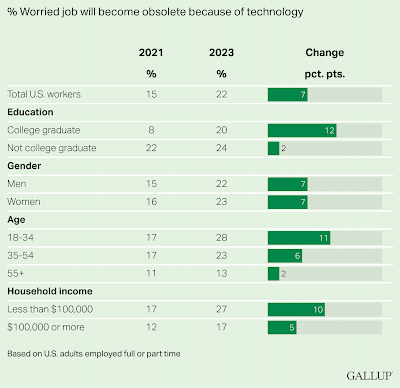A recent poll by Gallup looks at one of the concerns of a significant percentage of American workers; the fear of job loss. In particular, we will focus of the fear of job losses related to the implementation of artificial intelligence and other technologies. This is known as the fear of becoming obsolete or FOBO.
Gallup polled 522 adults throughout August 2023 with 491 of these adults being employed either full- or part-time. They were asked the following questions:
1.) Please indicate whether you are worried or not worried about each of the following happening to you, personally, in the near future. How about:
a.) that your benefits will be reduced
b.) that your wages will be reduced
c.) that your job will become obsolete because of technology
d.) that you will be laid off
e.) that your hours at work will be cut back
f.) that your company will move jobs to countries overseas
2.) Are you worried that you will be laid off?
3.) Are you worried that your hours at work will be cut back?
4.) Are you worried that your wages will be reduced?
5.) Are you worried that your benefits will be reduced?
6.) Are you worried that your company will move jobs to countries overseas?
7.) Are you worried that your job will become obsolete or unnecessary because of technology?
As I noted above, we will focus on the fear of job loss related to technological advances. Here is a graphic showing the growing percentage of American workers that are worried that their job will become obsolete because of technology:
Concerns about FOBO have increased from 13 percent in August 2017 to 22 percent in August 2023, an increase of 9 percentage points or 69.2 percent.
The concerns about FOBO vary demographically and have increased over the past two years as shown on this graphic:
Concerns about technologically-driven job obsolescence has grown the most over the past two years among college graduates under the age of 34 with household incomes of less than $100,000. It's surprising to see that concerns about FOBO is now more-or-less equal among non-college graduates and college graduates when just two short years ago, only 8 percent of college graduates were concerned about technology supplanting their work lives compared to 22 percent of non-college graduates.
Thanks to Visual Capitalist, we have a clear picture of the American industries that are at the highest potential for automation:
I was rather surprised to see that architecture and engineering were among the most automation vulnerable industries, particularly given the very specific skill sets and extensive education that are required to perform in these industries. The most ironclad jobs will be among those industries that rely heavily on manual labour (i.e. construction) and while transportation is relatively safe for the time being, jobs will be threatened by the use of AI-driven automation/self-driving vehicles which is expected to impact the trucking industry over the next 5 to 10 years as shown here:
Phase One: will involve a technique called platooning, in which a fleet of trucks will follow a lead truck on the highway
Phase Two: technology will have developed enough to have a human driver in only the lead truck while a convoy of autonomous trucks follows closely behind. Expected by 2025.
Phase Three: the lead trucks are completely autonomous on the highway. However, a human driver will still likely be needed in the lead truck for navigating small roads and loading docks. Expected around 2030.
Phase Four: completely driverless autonomous trucks are on the roads at scale. Optimistic estimates say it will come sometime in the early 2030s, while the more conservative ones say it will take until the end of that decade.”
Let's close with this thought. With the average cost of college in the United States hitting $36,436 per student per year including tuition and fees, books, supplies and living expenses, one certainly has to question the value of spending four plus years educating oneself after high school. Perhaps those who take jobs as mechanics, carpenters, electricians and plumbers are the smart ones after all.









No comments:
Post a Comment